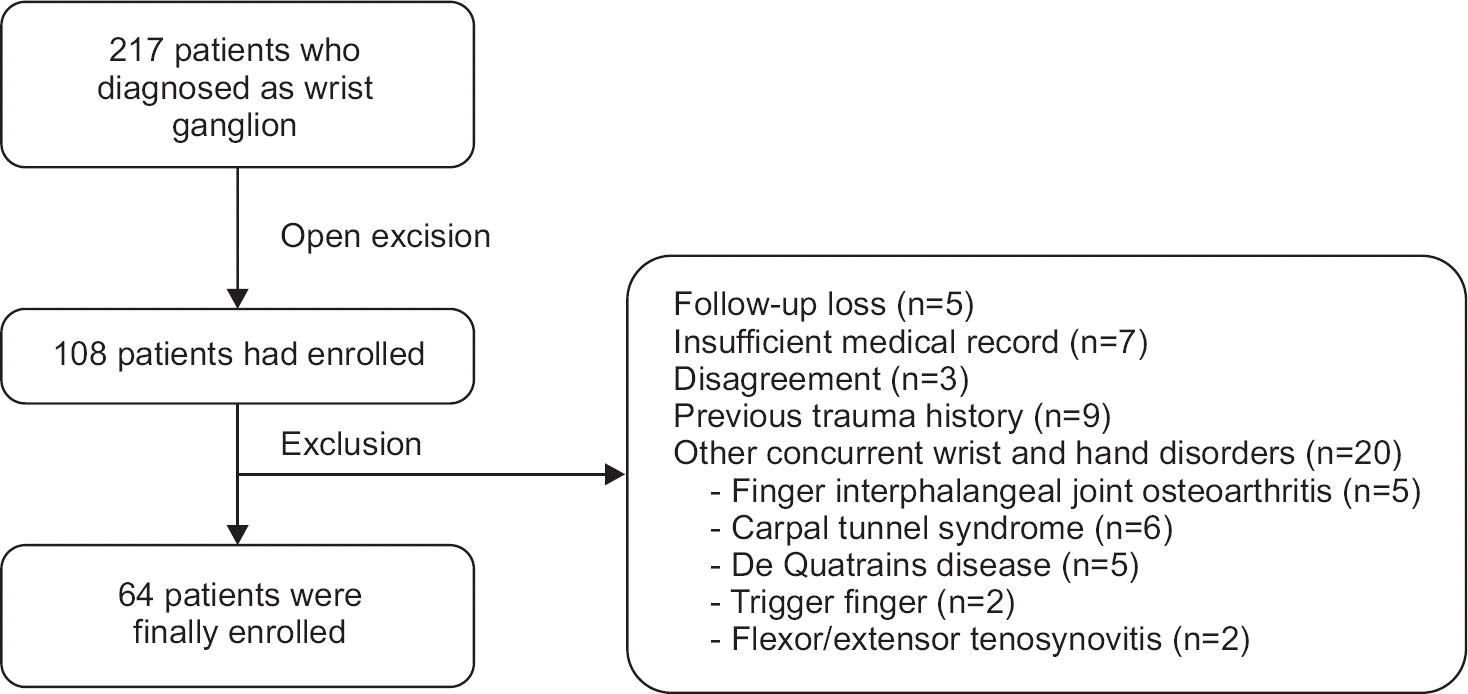Abstract
Purpose
The purpose of this study was to verify the relationship between the residual pain and preoperative carpal instability, as well as the generalized laxity after open excision of wrist ganglion.
Materials and Methods
Sixty-four patients, who received open excision of wrist ganglion, were retrospectively enrolled. The relationships between residual pain (visual analogue scale, VAS) and postoperative function (quick disabilities of the arm, shoulder and hand, quick-DASH), between residual pain and preoperative carpal instability, as well as generalized laxity were evaluated. The carpal instability was assessed from radiologic carpal instability (dorsal intercalated segment instability and volar intercalated segment instability) and Watson scaphoid shift test. The generalized laxity was assessed by the Beighton hypermobility score.
Results
Pain VAS and quick-DASH were significantly improved postoperatively. There was a significant difference in postoperative residual pain between those with (n=6) and without carpal instability (n=58) (+: 2.50±1.76 vs. -: 1.18±1.24; p=0.022), but there was no correlation between carpal instability and postoperative quick-DASH. Both postoperative residual pain and quick-DASH had no correlation with generalized laxity (n=18).
Go to : 
REFERENCES
3. Nahra ME, Bucchieri JS. Ganglion cysts and other tumor related conditions of the hand and wrist. Hand Clin. 2004; 20:249–60.

4. Duncan KH, Lewis RC Jr. Scapholunate instability following ganglion cyst excision. A case report. Clin Orthop Relat Res. 1988; 228:250–3.
5. Jagers Op Akkerhuis M, Van Der Heijden M, Brink PR. Hyaluronidase versus surgical excision of ganglia: a prospective, randomized clinical trial. J Hand Surg Br. 2002; 27:256–8.

6. Canale ST, Beaty JH, Campbell WC. Campbell's operative orthopaedics. 2012. 12th ed. St Louis;Mosby: p. 3685–6.
7. Gude W, Morelli V. Ganglion cysts of the wrist: pathophysiology, clinical picture, and management. Curr Rev Musculo-skelet Med. 2008; 1:205–11.

8. Head L, Gencarelli JR, Allen M, Boyd KU. Wrist ganglion treatment: systematic review and meta-analysis. J Hand Surg Am. 2015; 40:546–53.

9. Clay NR, Clement DA. The treatment of dorsal wrist ganglia by radical excision. J Hand Surg Br. 1988; 13:187–91.

10. Dias JJ, Dhukaram V, Kumar P. The natural history of untreated dorsal wrist ganglia and patient reported outcome 6 years after intervention. J Hand Surg Eur Vol. 2007; 32:502–8.

11. Dias J, Buch K. Palmar wrist ganglion: does intervention improve outcome? A prospective study of the natural history and patient-reported treatment outcomes. J Hand Surg Br. 2003; 28:172–6.

14. Kim JP, Seo JB, Park HG, Park YH. Arthroscopic excision of dorsal wrist ganglion: factors related to recurrence and postoperative residual pain. Arthroscopy. 2013; 29:1019–24.

15. Hwang JJ, Goldfarb CA, Gelberman RH, Boyer MI. The effect of dorsal carpal ganglion excision on the scaphoid shift test. J Hand Surg Br. 1999; 24:106–8.

17. Canale ST, Beaty JH, Campbell WC. Campbell's operative orthopaedics. 2012. 12th ed. St Louis: Mosby;p. 3455–9.
18. Lee GW, Lee SM, Suh BG. The impact of generalized joint laxity on the occurrence and disease course of primary lumbar disc herniation. Spine J. 2015; 15:65–70.

19. Juul-Kristensen B, Røgind H, Jensen DV, Remvig L. Inter-examiner reproducibility of tests and criteria for generalized joint hypermobility and benign joint hypermobility syndrome. Rheumatology (Oxford). 2007; 46:1835–41.

20. Kennedy CA, Beaton DE, Smith P. . Measurement properties of the QuickDASH (disabilities of the arm, shoulder and hand) outcome measure and cross-cultural adaptations of the QuickDASH: a systematic review. Qual Life Res. 2013; 22:2509–47.

21. Kang HJ, Koh IH, Kim JS, Choi YR. Coexisting intraarticu-lar disorders are unrelated to outcomes after arthroscopic resection of dorsal wrist ganglions. Clin Orthop Relat Res. 2013; 471:2212–8.

22. Mehdian H, McKee MD. Scapholunate instability following dorsal wrist ganglion excision: a case report. Iowa Orthop J. 2005; 25:203–6.
23. Rizzo M, Berger RA, Steinmann SP, Bishop AT. Arthroscopic resection in the management of dorsal wrist ganglions: results with a minimum 2-year follow-up period. J Hand Surg Am. 2004; 29:59–62.

24. Kivett WF, Wood FM, Rauscher GE, Taschler NA. Does ganglionectomy destabilize the wrist over the long-term? Ann Plast Surg. 1996; 36:466–8.
25. Povlsen B, Peckett WR. Arthroscopic findings in patients with painful wrist ganglia. Scand J Plast Reconstr Surg Hand Surg. 2001; 35:323–8.
26. McKeon KE, London DA, Osei DA. . Ligamentous hyperlaxity and dorsal wrist ganglions. J Hand Surg Am. 2013; 38:2138–43.
Go to : 
Table 1
Demographics of the Cohort
Table 2
Correlations between Postoperative Pain VAS and Other Variables
Table 3
Correlations between Postoperative Quick-DASH and Other Variables




 PDF
PDF ePub
ePub Citation
Citation Print
Print



 XML Download
XML Download